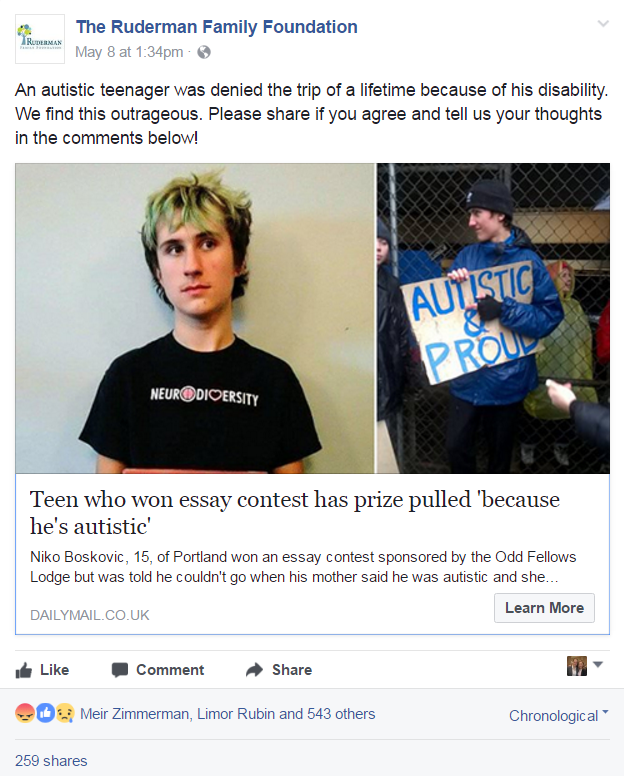
Yes It Is About Autism—The Discrimination Against Niko Boskovic
At the end of last month, the story of Niko Boskovic started making the rounds in some outlets, like the Daily Mail and the Oregonian and got many social media users talking. The gist of the story is that a talented high schooler from Oregon—Niko Boskovic—won an essay contest which prize was to send him on a trip to the United Nations with a few hundred other prize-winning young people from around the world. And then the organization hosting this trip—the United Nations Educational Pilgrimage for Youth, Inc. (UNEPY)—stripped Boskovic of the prize allegedly after finding out that he is autistic.
When we at the Ruderman Family Foundation posted about this story on Facebook, we received many dozens of comments, and most of them were outraged about this injustice and blatant act of discrimination. However, there was a handful of them that took a different stance, and those are the ones I’d like to address here.
But before I do, I’d like to make it clear that even though I’ll be referring to the Americans with Disabilities Act (ADA), this post is not about the legality of what UNEPY did. I’m not a lawyer and the Ruderman Family Foundation does not provide any legal counsel.
With that said, the ADA is a landmark legislation that protects people with disabilities from discrimination and mandates that reasonable accommodations be made for people with disabilities by employers and public accommodations. While its enforcement is a separate story, the intent is clear: it seeks to enable the inclusion of people with disabilities in public life. It is saying that people with disabilities have a right to be fully integrated into our society and participate in all the things that people without disabilities participate in as well.
That is why this comment on the story of Niko is puzzling:
Asking “How autistic is he” implies that maybe the decision to include or exclude him from participation would make sense if he fell on a certain point on the autism spectrum. In other words it implies that civil rights only apply to certain people with disabilities—but that’s not how rights work. So the answer to this question is that this question is irrelevant.
Another implication we found puzzling was in this exchange between Jay Ruderman and conversation between two commenters:
The respondent to the original comment is essentially claiming that Boskovic wasn’t stripped of the prize because he is autistic, but because he needed assistance with communicating (which is why his mother raised money to accompany him on the trip and provide that assistance, free of charge to UNEPY). The commenter says, “I already said it wasn’t justified but to claim it was solely because the child has autism is borderline libel.” At first glance this comment may make sense to some people, but at second glance, it would be like saying, “it’s not because she is paralyzed, but it’s because she uses a wheelchair.” Or something like “It’s not because he has schizophrenia, but it’s because he is taking medications to manage his disability.” These arguments make no sense.
The bottom line is that if someone has a disability, it sometimes means they require accommodations. If you use this need as reason to deny access, you are discriminating against a person with a disability because of that disability. And that is not just against the law, but it is against the very concept of equal rights.
About the author Kristina Kopić, better known as Tina, is a former academic, a writer, a martial artist, and a fan of deconstructing all social constructs, especially those of gender, race, and disability in order to expose and challenge their injustices and create a more inclusive and fair world. She is the Advocacy Content Specialist at the Ruderman Family Foundation, lives with her wife, their two cats, and is currently dabbling in rugby.
Stay Included
To stay up to date on our most recent advocacy efforts, events and exciting developments, subscribe to our newsletter and blog!

















